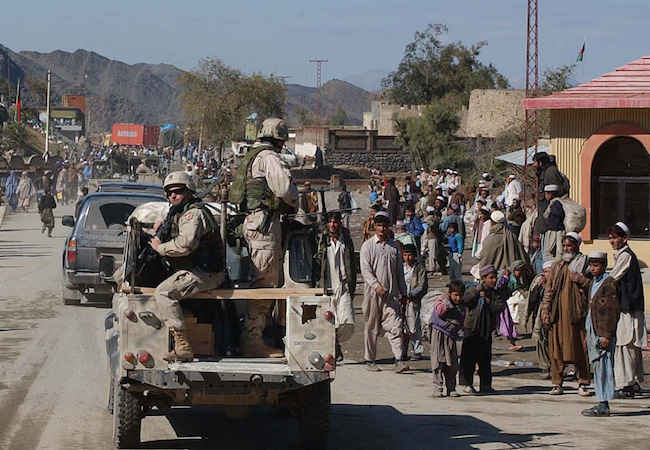US military withdrawal from Afghanistan: Implications for Pakistan

By Abdul Wasay Ajmal
Afghanistan has for a greater part of her history seen conflict of various types and magnitudes. From warring warlords fighting to gain dominance, to foreign intervention bent on achieving their political objectives. The people of Afghanistan divided along the lines of ethnicity, class and sect have witnessed great suffering and loss of precious lives. The United States, the latest entrant in Afghanistan sought to gain its political and strategic objectives primarily through the use of military power. The United States had led successful and devastating campaigns in Iraq in which the technological and military dominance was one of the deciding factors which lead to the end of the Saddam regime. Seeking to implement a similar model and to establish a US friendly regime the United States faced stiff resistance at the hands of the Afghan Taliban. Guerilla fighting techniques combined with the harsh mountainous terrain, made it difficult for a land army to establish its dominance in the afghan regions.
Today after having stayed in Afghanistan for almost two decades the United States under the current administration of President Joe Biden now seeks to end the “forever wars”. This deal signed by major stakeholders concluded into a complete US withdrawal from the region where in the people of Afghanistan would be free to choose a path for their future. While this paints a rosy picture on the Afghan situation, it’s important to study the implications of a complete US withdrawal on the people of Afghanistan and for its neighboring country Pakistan. President Joe Biden has selected September 11 of this year to be the date in which US troops completely withdraw from Afghanistan. The withdrawal would effectively end US presence in Afghanistan under the agreed terms and would thus leave the country to charter its own political course. It is now possible to suggest that the Afghan Taliban would push for its demands establishing an Islamic Emirate, a return to its form of Islamic governance. Despite being in the corner the government being the major political force has continued to negotiate with the Taliban in order to reach a consensus on important issues underlined in the original agreement.
The Afghan Taliban has for long demanded a complete withdrawal of US troops and to establish an Islamic Emirate. Within Afghanistan, the Afghan Taliban has continued to rage a bloody campaign consisting of attacks on civilians and government officials. With their strong religious ideology the Taliban continue to draw popular support from the people despite their repeated attacks. The Afghan government already weakened by repeated assaults, combined with a poor governance structure faces a threat of a possible ouster from power after the US withdrawal. A possible Afghan Taliban led government after the US withdrawal could see a revert to the previous government system lead by the Taliban. Foreign countries, including Pakistan have expressed fear of a possible civil war after a US withdrawal from Afghanistan. Within Afghanistan, tribal warlords have continued to fight for influence and dominance in their respective regions. Afghan history is telling in this regard as without threat of invasion from an external enemy, the warring factions have been involved in bitter conflicts resulting in instability throughout the provinces. Today despite being the largest faction, the Taliban is not a uniform organization with many joined through coalitions or through defeats. Largely consisting of ethnic Pashtuns, the rise of the Taliban would be seen as a threat to ethnic minorities who may resort to militancy in resistance to a Taliban led government or coalition.
Pakistan has maintained its stance of being a principal stake holder in promoting peace and stability in Afghanistan. The two neighbors despite sharing strong common bonds of religion, culture and ethnicities have had a turbulent relationship since the creation of Pakistan in 1947. Both countries have expressed concerns of terror groups operating through their respective territories with the aim of destabilizing governments and to inflict political, economic and social instability through “state sponsored proxies”. For Pakistan the Afghan peace process is critical in order to achieve peace and stability in its troubled provinces of Baluchistan and regions which were part of former FATA. The China Pakistan Economic Corridor is a vital link which has been consistently targeted by militants operating from across the western border. In recent trips made by the Foreign Minister and the Prime Minister to Kabul both stressed the need for pursuing peace through dialogue and negotiations and that for Pakistan the “stakes are very high”. With threat of a possible civil war after a US withdrawal, it’s important that Pakistan continues to push for a peaceful resolution through its influence within the Afghan Taliban leadership circle.
The situation in Afghanistan has never been in such a crucial stage. The US withdrawal on September 11 this year which if followed through would end a bloody chapter in the history of Afghanistan. The effect both short and long term of this withdrawal would have implications on the people of Afghanistan and the region as well. For Pakistan, the stakes have never been higher with Pakistan hoping and participating in helping to achieve a peaceful and stable Afghanistan. It is important for Pakistan as a peace on its Western borders would go a long way in aiding Pakistan in its battle against militancy and extremism. With constant fears of the country falling into civil war, its important for Pakistan to play its role in ensuring that such a situation which is detrimental to both countries never takes place. A pro-active foreign policy approach and by providing platforms of negotiations would help in enabling an environment where a peaceful resolution can be achieved without conflict erupting. Peace in Afghanistan is long overdue and it’s up to the stake holders to decide the future course for the country.
Abdul Wasay Ajmal is a student studying at National Defense University Islamabad and works at the Institute of Strategic Studies Islamabad.




